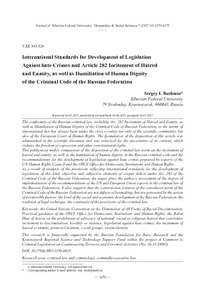International Standards for Development of Legislation Against hate Crimes and Article 282 Incitement of Hatred and Enmity, as well as Humiliation of Human Dignity of the Criminal Code of the Russian Federation
Скачать файл:
URI (для ссылок/цитирований):
https://elib.sfu-kras.ru/handle/2311/33661Автор:
Bushmin, Sergey I.
Бушмин, С.И.
Дата:
2017-07Журнал:
Журнал Сибирского федерального университета. Гуманитарные науки. Journal of Siberian Federal University. Humanities & Social Sciences;2017 10 (7)Аннотация:
The conformity of the Russian criminal law, including Art. 282 Incitement of Hatred and Enmity, as well as Humiliation of Human Dignity of the Criminal Code of Russian Federation, to the norms of international law has always been under the close scrutiny not only of the scientific community, but also of the European Court of Human Rights. The formulation of the disposition of this article was admonished in the scientific literature and was criticized for the uncertainty of its content, which violates the freedom of expression and other constitutional rights.
This publication makes comparison of the disposition of the criminal law norm on the incitement of hatred and enmity, as well as the humiliation of human dignity, in the Russian criminal code and the recommendations for the development of legislation against hate crimes prepared by experts of the UN Human Rights Council and the OSCE Office for Democratic Institutions and Human Rights.
As a result of analysis of the provisions reflecting international standards for the development of legislation of this kind, objective and subjective elements of corpus delicti under Art. 282 of the Criminal Code of the Russian Federation, the paper gives the author’s assessment of the degree of implementation of the recommendations of the UN and European Union experts in the criminal law of the Russian Federation. It also suggests that the construction features of the considered norm of the Criminal Code of the Russian Federation are not defects of lawmaking, but are generated by the action of permissible factors: the level of the social and economic development of the Russian Federation, the tradition of legal technique, the continuity of the provisions of the criminal law Соответствие российского уголовного закона, в том числе ст. 282 УК РФ «Возбуждение не-
нависти и вражды, а равно унижение человеческого достоинства», нормам международ-
ного права всегда было под пристальным вниманием не только научной общественности,
но и Европейского суда по правам человека. Формулировка диспозиции этой статьи подвер-
галась замечаниям в научной литературе и вызывала критику в части неопределенности
ее содержания, нарушающего свободу выражения мнений и иные конституционные права.
В настоящей публикации проведено сопоставление диспозиции уголовно-правовой нормы рос-
сийского уголовного закона о возбуждении ненависти и вражды, а равно унижении человече-
ского достоинства, и рекомендаций по разработке законодательства против преступлений
на почве ненависти, подготовленных экспертами Совета по правам человека ООН и Бюро
по демократическим институтам и правам человека ОБСЕ.
В результате анализа положений, отражающих международные стандарты разработки за-
конодательства такого рода, объективных и субъективных признаков состава преступления,
предусмотренного ст. 282 УК РФ, дана авторская оценка степени реализации в уголовном за-
коне РФ рекомендаций специалистов ООН и Европейского союза, высказано суждение о том,
что особенности конструирования рассматриваемой нормы УК РФ не являются дефектами
правотворчества, а порождены действием допустимых факторов: уровнем социально-эко-
номического развития РФ, традицией юридической техники, преемственностью положений
уголовного закона
Коллекции:
Метаданные:
Показать полную информациюСвязанные материалы
Показаны похожие ресурсы по названию, автору или тематике.
-
Constitutional and Legal Problems of Anti-Extremist Legislation in Russia: Drawbacks of Legislative Regulation
Kondrashеv, Andrey A.; Кондрашев, А.А. (Сибирский федеральный университет. Siberian Federal University., 2015-10)The paper criticises doctrinal approaches to the definition of extremism, as well as the legal definition of extremist activities; the author identifies gaps and contradictions in legal regulation of responsibility for ... -
Язык вражды в российских качественных печатных СМИ (на примере журнала «Русский репортер»)
Смирнова, Валерия Александровна (Сибирский федеральный университет, Красноярск, 2017) -
Correlation between extremist crimes under Articles 280 and 282 of the Criminal Code of the Russian Federation, and rehabilitation of Nazism (Article 354.1 of the Criminal Code of the Russian Federation)
Bushmin, Sergey I.; Бушмин, С.И. (Сибирский федеральный университет. Siberian Federal University., 2016-08)The problem of correlation between extremist crimes under Articles 280 and 282 of the Criminal Code of the Russian Federation, and rehabilitation of Nazism within the doctrine of criminal law and legal practice is not ... -
Комментарий к уголовному законодательству о противодействии террористической и экстремистской деятельности
Бушмин, Сергей Иванович; Москалев, Георгий Леонидович (СФУ, Красноярск, 2018)На основе анализа действующего законодательства, сложившейся практики его применения и последних научных разработок дается научно-практический комментарий статей Уголовного кодекса Российской Федерации, регламентирующих ... -
Комментарий к уголовному законодательству о противодействии террористической и экстремистской деятельности
Бушмин, Сергей Иванович; Москалев, Георгий Леонидович (СФУ, Красноярск, 2018)На основе анализа действующего законодательства, сложившейся практики его применения и последних научных разработок дается научно-практический комментарий статей Уголовного кодекса Российской Федерации, регламентирующих ...

